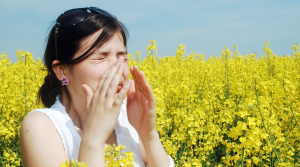 Spring has finally arrived at UWG, and with the season comes many things: warmer weather, blooming flowers, rain, and the infamous pollen. Many people dread the arrival of spring for one reason, and that reason is the yellow demon. Pollen is the cause of many people’s seasonal allergies, which can lead to them becoming very sick.
Spring has finally arrived at UWG, and with the season comes many things: warmer weather, blooming flowers, rain, and the infamous pollen. Many people dread the arrival of spring for one reason, and that reason is the yellow demon. Pollen is the cause of many people’s seasonal allergies, which can lead to them becoming very sick.
This spring has had the highest pollen count in the last few years and this has caused many UWG students to line up at the doors of the Health Center. Pollen affects people in different ways and can have either a light reaction to the powdery yellow substance or a very severe reaction.
“The CDC has speculated that this year will be the worst out of the last three years,” says Dr. Jim Martin, Nurse Practitioner at UWG.
Martin has been the nurse practitioner at UWG for ten years and he has worked in the healthcare industry for 29 years. He has worked hands-on with people that have experienced problems with allergies to pollen.
There are many kinds of plants that produce many types of pollen and the types of pollen varies by region. Georgia has a lot of trees and other plants, which is good for a diverse ecosystem, but it means there is a potential for pollen related allergies. Some plants are worse than others when it comes to pollen. Some of the worst offenders are ragweed, oak trees, maple trees, and pine. Seasonal allergies affect everyone differently but there are some unifying symptoms.
“The most common and classic symptoms people come in with is sneezing and watery eyes,” says Martin. “The after effects are headaches, draining of sinuses and sore throats. Sometimes people will get an odd rash and it is a by product of their bodies over responding to their allergens.”
Some people find solace in the Fall months when tree pollen has decreased, but some people still suffer from the yellow dust.
“The allergy season usually begin during the March month and will taper off at May or June for tree allergies,” said Martin. “If you have grass allergies, it can go all Summer and Fall long.”
Even though pollen can make some people feel terrible, there are ways to prevent the wrath of the yellow substance. Martin recommends going to an allergist to find out what exact allergens have an effect on the individual so they can better prepare for the upcoming allergy season.
“The key to preparing for the allergy season is knowing what your allergies are and daily use of medication,” says Martin. “Once you are able to get the medicine in your system before the allergy season begins, you will be fine.”
Martin wants to highlight a resource that is not as widely used by students of UWG as it should be. This resource is the pharmacy in the health center.
“Any student that pays the health fee can come in and access the pharmacy without scheduling an appointment,” says Martin.
At the pharmacy, students are able to access helpful allergy medicines such as Flonase and Zyrtec. Another way to help with seasonal allergies that Martin highlighted was eating local honey. When a person eats local honey, they are ingesting local pollen and over time a person may become less sensitive to this pollen.
Another way to prevent the effects of allergies that Martin broadcasts is the use of allergy shots. Allergy shots work like a vaccine for allergies. The body responds to injected amounts of a particular allergen, given in gradually increasing doses, by developing immunity to the allergen.
The Spring time can be a terrible time for people who are affected by pollen. By figuring out what allergens trigger them and taking medication, people are able to reclaim and enjoy their Spring.
You may also like
-
UWG Fails to Protect Student Safety From Radical Conservative Rhetoric Under the Guise of Free Speech
-
UWG’s Ingram Library Hosts Pop-Up Study Spot to Help Students Prepare for Finals Week
-
UWG Offers Mental Health Support And Academic Services To Maintain Student Success During Finals Week
-
UWG Alumnus Shares His Experience Exploring the Underground Flood Channels of Las Vegas
-
Georgia Students Simulate the Struggles of Dementia